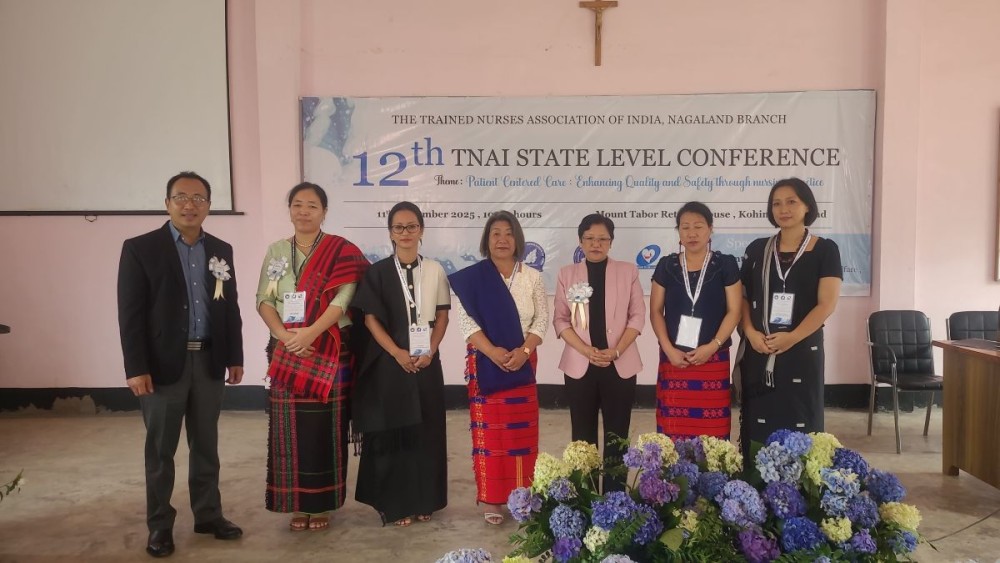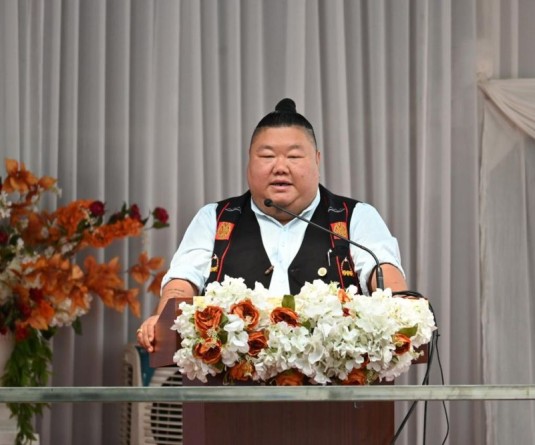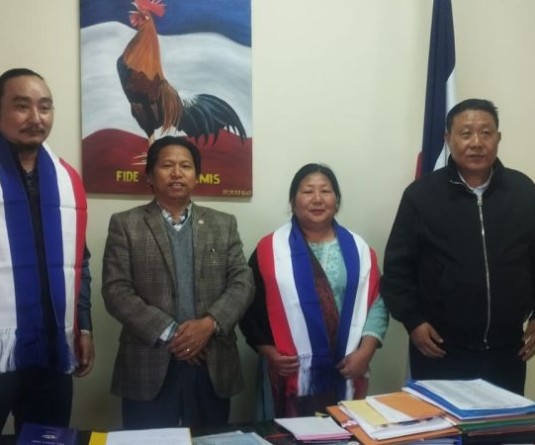S. Tainiu and others during 12th TNAI State Level Conference 2025 on September 11. (Morung Photo)

Highlights nursing challenges and patient-centered care in Nagaland
Our Correspondent
Kohima | September 11
The Trained Nurses’ Association of India (TNAI), Nagaland State Branch held its 12th State Level Conference under the theme “Patient-Centred Care: Enhancing Quality and Safety through Nursing Practice.” It was held at Mount Tabor Retreat House of Diocese of Kohima on September 11.
The conference brought together nurses, educators, and healthcare professionals from across Nagaland to deliberate on the evolving role of nurses and the urgent need to strengthen human resources in the state’s healthcare system.
Addressing the inaugural session, S Tainiu, Secretary, Department of Health & Family Welfare, Nagaland, called upon nurses to reflect on their pivotal role in strengthening healthcare delivery system in the state.
“From the moment a patient is admitted, you are the ones who monitor vital signs, administer medicines, manage wounds, and provide emotional support,” she said, adding that patients frequently confide in nurses what they may not share with doctors demonstrating the deep trust the profession commands.
Highlighting their dual role as caregivers and educators, Tainiu emphasized the importance of patient advocacy and health education in ensuring continuity of care even after discharge.
She acknowledged the pressing manpower shortages but lauded nurses for continuing to serve with resilience and compassion. “Machines may assist, but only human compassion can heal and give hope,” she remarked.
She said that nurses are not just care givers but they advocates and ensure that patients' rights are respected, concerns are heard and patient can make informed health decisions.
Stating that compassionate nurses lead to higher patient satisfaction, better adherence to treatment plans and lower mortality rates, she said “This approach promotes healing by addressing patients' physical, emotional and psychological needs.”
In today’s working environment, she said, we need to have interdisciplinary collaboration which is necessary for providing holistic care. “Nurses are important part of health care, shaping both individual health and societal well being,” she added.
Shortage of nurses in Nagaland
TNAI Nagaland State Branch President, S Tiakala Longkumer reflected on the Association’s journey since its inception in 1973 and its milestone Golden Jubilee celebrated last year.
She acknowledged the ceaseless efforts of nurses working round-the-clock in hospitals and extended gratitude to members from across districts for ensuring the successful conduct of the 12th conference.
She informed that TNAI Nagaland now has over 2,000 life members, signaling the growing strength of the nursing fraternity.
Sharing overview of the state’s nursing scenario, she said that Nagaland currently has three Joint Directors of Nursing, four Nursing Superintendents in district hospitals, four Principals of nursing colleges, one ANM training school, 11 Assistant Nursing Superintendents, 25 Nursing Tutors, 572 staff nurses, and 841 ANMs, among others.
However, she said that the state is facing acute shortage of nurses across hospitals, CHCs, and PHCs, particularly in meeting the required nurse-patient ratio. “If not for contractual nurses, many hospitals would collapse under the pressure,” she said, urging the government to prioritize recruitment and retention. “As we step into the 51st year of our association, let us strive towards continuous professional growth, policy advocacy, and leadership in healthcare,” she concluded.
Enhancing quality and safety through nursing
Talking on the theme “Patient-Centred Care: Enhancing Quality and Safety through Nursing,” Prof. L. Emi Humtsoe, College of Nursing, CIHSR, Dimapur, said patient-centred care means respecting patient dignity, culture, and choices, listening actively to their concerns and responding to those needs and empowering them with information and participation in decision-making. “Sometimes the best medicine is faith, hope, and a caring nurse,” she said
When technology and advanced practices are at the forefront, it’s the nurse who ensures that the human touch is never lost. Machines can monitor, but only a nurse can care, she said.
She said that quality in healthcare means doing the right thing, in the right way, for every patient, every time. Safety means ensuring that in our hands, patients are protected from harm.
‘Without quality and safety, trust in healthcare collapses-no matter how advanced our hospitals or how modern our technology,’ Prof Humtsoe said.
In this context, it is nurses who are the first and last line of defence: ensuring infection control, safe medication practices, vigilant monitoring, and, most importantly, noticing the small changes that can save a life, she said.
Stating that Nagaland state’s unique geography and resources bring both challenges and opportunities, Prof Humtsoe said “Remote communities, limited infrastructure, and manpower shortages test our resilience.”
Bendangnaro, Deputy Director of Nursing, Directorate of Health & Family Welfare and Dr. N. Leamnyei Konyak, Chief Medical Officer, Kohima also spoke at valedictory session.
The session also witnessed Change of Guard, distribution of prizes and prayer for the new team of TNAI Nagaland State Branch to be led by Khuniho Assumi as president. Neisavolu proposed the vote of thanks.





